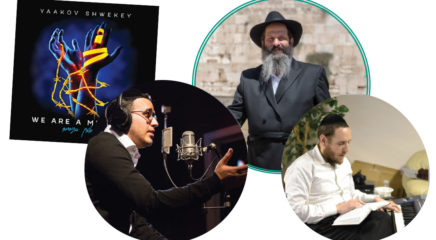Y
aakov Shwekey’s recently released Musica album is exactly on trend, featuring energized anthem-style songs with original theme-based lyrics and catchy melodies. Behind the scenes, talented lyricist Miriam Israeli keeps on crafting those distinctive, powerful words. As the creative brain behind the words to Benny Friedman’s spirited “Ivri Anochi,” and “Yesh Tikvah,” among dozens of other well-known songs, Miriam is responsible for the Hebrew and English words to many of the tracks on Musica, including “Aish,” “Netzach Yisrael,” “One Heart,” “Perfect World,” and the title track “Musica.”
“When I wrote ‘Maamin Benissim’ [“Ani maamin benissim, ani yodeia sheyesh Elokim… yishlach li et haneis sheli”] I had an inspiration and I sent it off to Yaakov Shwekey,” says Miriam. “But for Musica, the concepts were all Shwekey’s and Yitzy Waldner’s, and they approached me for lyrics.”
She says that working with singers and producers who have strong ideas about the music they want to produce makes her job easier. “They had already come up with a concept for each song,” she says. “They had ideas about exactly what sound they wanted, which was a bit of a challenge for me, but also healthier, because it’s much harder if an artist has no confidence in his own vision.”
Miriam composes, too, and when Shwekey mentioned the idea for a song using the theme “Netzach Yisrael lo yeshaker,” which attests to the eternal existence of the bond between Hashem and Klal Yisrael, Miriam came up with both lyrics and a melody — although the end product didn’t incorporate her melody.
Sometimes a burst of inspiration is enough to carry the creation of the song from inception to completion, but there are also times when Miriam wrestles with each word. “For ‘One Heart,’ I wrote the English section right off the bat, standing at the bus stop one morning [“You and I have shared one heart, we were never meant to be apart”], but the Hebrew was trickier. It needed a lot of moving around until it ‘sat’ right on the melody,” she recalls.
Usually, the melody is composed first and acts as an inspiration for the lyrics. But for the song “Aish” [“Tadlik et haeish, tagid im yesh, nair et halaylah kulo…”], Miriam received only the concept. She wrote lyrics, which gave Yitzy Waldner the inspiration to compose a melody. But the words didn’t fit exactly and had to be rewritten. The melody was tweaked, and then the lyrics were tweaked again. Eventually, Miriam says, the composer came back with the song’s final arrangement, “and it blew me away. It was just so strong.”
The song “Yishtabach Shemo,” on the other hand, was completed right away, no redrafting or second versions [“Yishtabach Shemo, al kol ma shebara li, al kol ma shekarah li…”]. As for the album’s title track, “That was a fun one to write,” says Miriam. “I instantly loved the melody.”
Today’s lyrics are simple yet sophisticated. Miriam admits that she sometimes compromises on her original word choices for the sake of simplicity or rhythm, but her audience will never know. Like artists in all media, she says, “You can go on perfecting something forever, but at some point you have to close on a final version.”
Yiddish was actually Miriam’s first language, but once she started school, English moved into first place. Her songwriting career has taken off in both English and Hebrew, jumpstarted with songs like “Ima Tagidi Li,” which was written for a BJJ Seminary production. “Early on, I used to get stuck for words in Hebrew and would call a cousin to help me out,” Miriam explains. Although that’s no longer an issue, she says that a song like “Vehaya Hashem L’Melech” (on Mordechai Shapiro’s Machar album) “has a sophistication I could not have managed in Hebrew.” In Benny Friedman’s “Gut Shabbos” and Tzvi Silberstein’s “Todah,” she wrote Yiddish parts as well, and recently a well-known chassidic producer and singer has ordered Yiddish lyrics for an upcoming song.
Despite the cynicism that has come along with excessive commercialization, Miriam says the holy purpose of Jewish music is alive and well. “We artists are bringing out something from within ourselves, and even if it’s commercialized, it can still be real at its core. I believe singers really do want to inspire and make people happy and bring them closer to their roots.”
(Originally featured in Mishpacha, Issue 721)





